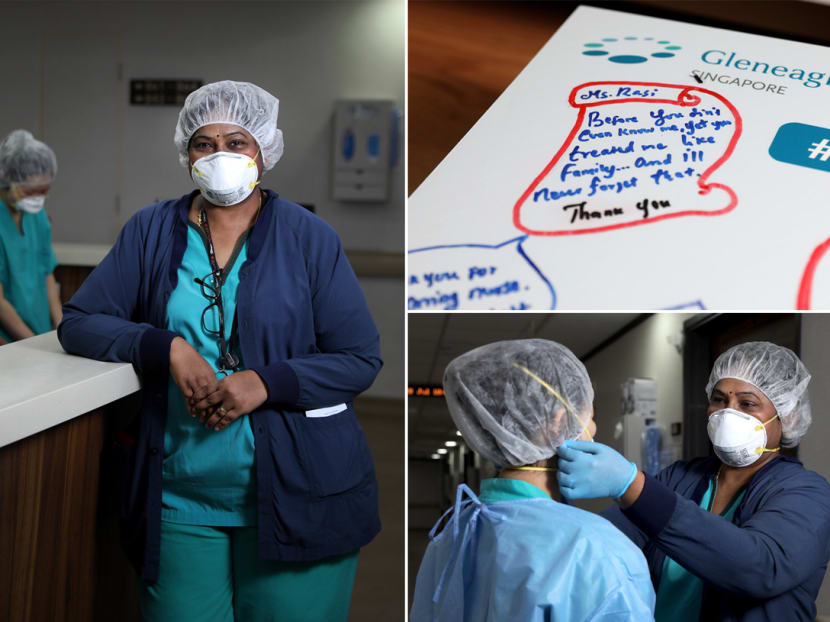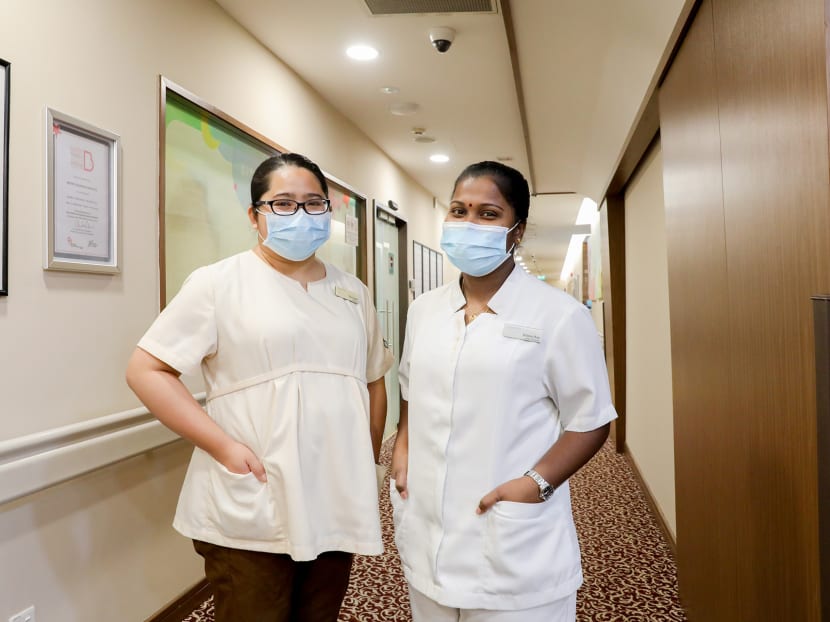Nurses’ Day: Nurses on the frontlines share how Covid-19 has changed their personal lives and work
SINGAPORE — Across the world, the Covid-19 outbreak has had a tremendous impact on frontline workers, who have had to make many sacrifices in order to perform their duties in essential services and in fighting the pandemic.

Madam Anparasi Muthu Veerappan (in the foreground of left photo), a nurse manager at Gleneagles Hospital, took care of migrant workers who had contracted Covid-19.
- Malaysian nurses Kristina Raja and Nor Sapiah have been separated from their families since March
- Nurse manager Anparasi Muthu Veerappan worked in a ward that cared for migrant workers
- Mdm Anparasi said that she opted to do so because she wanted to be a positive example to other nurses
SINGAPORE — Across the world, the Covid-19 outbreak has had a tremendous impact on frontline workers, who have had to make many sacrifices in order to perform their duties in essential services and in fighting the pandemic.
This Nurses’ Day on Aug 1, TODAY takes a closer look at three women whose lives have been altered by the health crisis.
THEY LONG TO SEE THEIR FAMILIES AGAIN
Ms Kristina Raja and Ms Nor Sapiah, who are nurses from Malaysia, have not seen their families in the four months since the country imposed a movement control order to curb the spread of the coronavirus on March 18.
Ms Sapiah, 31, was on vacation in Malaysia with her family when the news of the movement control order broke, leaving her caught in a dilemma of whether to stay in Malaysia with her family or continue working in Singapore.
“That day was also my anniversary with my husband, so it was really memorable,” she said. Ms Sapiah is a staff nurse at Mount Elizabeth Hospital’s intensive care unit (ICU).
Her husband reassured her that he would take care of their three-year-old daughter and encouraged her to continue pursuing her career goals in Singapore.
Ms Raja, 31, who is a staff nurse at the Mount Elizabeth Hospital’s maternity ward, recounted a similar story.
It was her last night visiting her hometown in Teluk Intan in Perak, Malaysia when she heard the news on Malaysia’s lockdown.
“We knew that there was going to be (a lockdown) but we did not expect them to close the border between JB (Johor Baru) and Singapore and we thought we could still commute daily,” she said tearfully.
Ms Raja, too, decided to make her way back to Singapore to continue her work and part-time studies, leaving behind her husband — who was recovering from a recent injury — and her aged mother.
“It was a nightmare… I spent time with my husband for two hours and then made my way back to Singapore,” she said.
“It was a terrible day… I have never seen that kind of crowd coming from Malaysia to Singapore.”
Both women said that they made the difficult decision to stay in Singapore as they wanted to continue their work and enjoy their jobs.
But what they initially thought would just be two weeks of being apart from their family, has stretched into months with no end in sight.
Though Singapore and Malaysia have announced that cross-border travel will soon resume between the two countries for some residents and business travellers, no details have been announced.
“Every day, the hope of going back home is decreasing… When (I first said goodbye to my husband) I thought it might be two to four weeks, but I did not expect that we would step into the fifth month,” Ms Raja said.
It has also been especially difficult for Ms Sapiah, who discovered that she was pregnant two weeks after the lockdown was imposed, and has had to attend prenatal medical appointments without her husband.
She is due to deliver her second child in November.
Both Ms Raja and Ms Sapiah call their families every day — sometimes many times a day when they are free or have a day off.
While these calls are the best parts of their day, they said that the most difficult part is holding in their sorrow and putting on a brave front so that their families do not worry about them.
Their silver lining? The support they have received from their friends and colleagues in the hospital.
As roommates, Ms Raja and Ms Sapiah have also been able to lean on each other and share their struggles with someone in the same situation.
Both of them stay at a hotel nearby as part of accommodation arranged by Parkway Pantai, which oversees hospitals such as Mount Elizabeth Hospital, Gleneagles and Parkway East Hospital.
Ms Raja said: “When you go to the ward, that is the happiest moment. (The nurses) will order food together, cook for each other… Some also offered to buy things for other Malaysian nurses who used to commute daily because they know we did not bring much here.
“This makes our lives so much happier because all of us are far away from family.”

‘I HAD TO BE A ROLE MODEL FOR MY NURSES’
When she was told that the orthopaedic surgical ward she oversees would be converted into a “fever ward” that takes in potential Covid-19 patients, Madam Anparasi Muthu Veerappan did not hesitate to take up the call to fight the coronavirus on the frontlines.
The hospital’s management had given the nurses in the ward the choice to opt out of the switch, recognising that some of them may be uncomfortable with putting themselves at risk of the virus, but the nurse manager in her 50s was certain that she wanted to take on the new responsibilities.
“My family was initially against (me working in the fever ward)... but I chose to go ahead as I needed to be a role model to my nurses and be an example to them,” Mdm Anparasi, who is known by her colleagues as Mdm Rasi, said.
The nurse manager of 8 West ward at Gleneagles Hospital was filled with a sense of pride when none of her nurses opted out of working in the ward despite some initially expressing some anxiety.
“There was a little bit of (hesitation)… but after reassuring them that we are in this together and we will be fine as long as we are protected, (everyone was understanding),” she said.
The initial few weeks were challenging and tiring as preparations were made to take in the new patients.
The nurses switched over from seven-hour to 12-hour shifts and the single rooms were converted to two-bedders to take in more patients.
When Gleneagles Hospital first took in Covid-19 patients in April, Mdm Rasi and her team of 12 nurses had to make more preparations, such as making a video for the migrant worker patients to explain to them about the infectious disease and why they have been taken to the hospital.
“The patients had fear and we needed to reassure them… Some of them did not even know that they were coming to a hospital environment. Some thought that they came here because they were dying, so there was a lot of anxiety,” she said.
As some of the workers spent weeks in the hospital waiting to be cleared of Covid-19, strong bonds began to forge between them and the nurses.
“We did not show any difference in treatment when caring for them, so they felt very touched. (Gleneagles) became like a home for them, and they treated us like sisters and mothers,” Mdm Rasi said.
Moved by the outpouring of gratitude from the workers, Mdm Rasi and her team of nurses arranged to cook a feast for them — fulfilling their requests for food that they were missing from home.
The team quickly came together and dishes were assigned to each person to prepare.
The nurses, as well as the hospital management, then distributed the food to the patients.
“It was a happy moment,” Mdm Rasi said.
Last month, the ward discharged all of its migrant worker patients.
It has since returned to being an enhanced surveillance fever ward that swabs and cares for patients with unknown sources of fever.
Mdm Rasi said that the goodbyes were bittersweet but ultimately, the nurses were happy to see their patients get well.
Some patients have continued to keep in touch, she said, calling the hospital to ask about the well-being of the nurses.
“One patient even told us that (our care) cannot be replaced by money and other patients said that they will always keep the nurses in their prayers,” she said.








